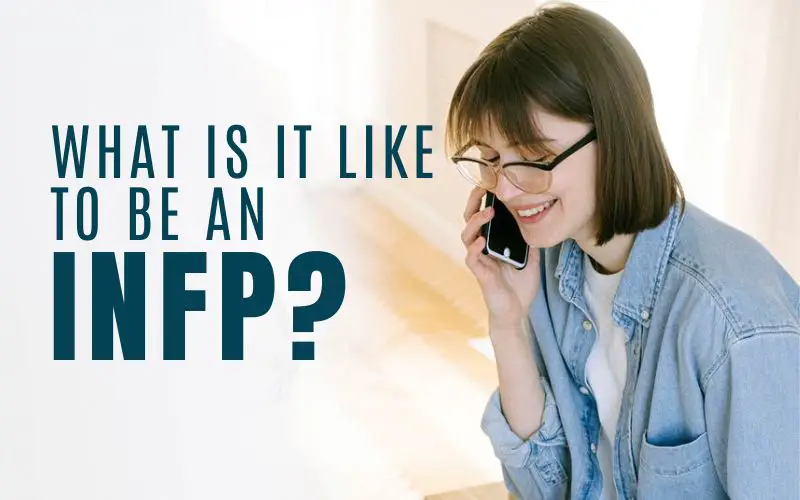INFP stands for Introverted-Intuitive-Feeling-Perceiving. If you’re familiar with the rest of the 16 Myers-Briggs personality types, you would know that INFPs are a misunderstood bunch.
Often misunderstood? I can’t blame people because INFPs are walking contradictions. Dang, I don’t even understand myself at times.
Most INFPs are dreamy, but only a few will comprehend our depth.
We’re kind, but selective with who to trust. Introverted, but are goofballs, too. Looks unbothered and independent, but stirs with a frequent emotional upsurge.
Moreover, because the world seems to turn for the extroverted and sensors, it’s so easy to misunderstand the mystic INFPs.
And although we’re forced to adapt to a structured, routine, and hierarchial-thriving society, INFPs remain… different.
I still believe our uniqueness is an asset every INFP should be happy to live with.
What Is It Like to Be an INFP?
Now, what is it like to be an INFP? As an INFP myself, let’s tour within the INFP’s mind.
1. Daydreams happen more than people could imagine.
This is my favorite part of being an INFP.
Unlike the sensors and logic-driven dudes, INFPs have an incomparable colorful life inside our minds rather than in the physical world.
Within our imaginations, a song, an interaction, or a simple thought could bloom either flowers or dead branches.
INFPs think and imagine nonstop. Dull time? Almost never.
Every free time is a journey to the realm of self-reflection, internal monologues, a trip back in the past, a peek into the future possibilities. These are daydreams that we architect ourselves.
But don’t underestimate INFP’s daydreams. When focused and directed, our “dreams” evolve into fruitful visions that display perfection and may benefit many. We can develop viable philosophies.
This could be the reason why INFPs are intrapersonally intelligent people.
Moreover, INFPs could look forward to the end goal, making them not only daydreamers but exceptional visionaries.
2. INFP minds are so vivid.

INFP minds are so vivid that even a textbook knowledge could have so much detail, emotions, and images embedded in our heads.
I could explain a history book chapter, not for what is written, but for what each figure in the history could’ve felt.
I wonder how pressuring the adversities were in the past, and the agony people probably faced.
INFPs dig deep into people’s convictions and motivations.
Such vividness makes INFPs good at remembering stories and details. They don’t memorize your stories. They dwell in it.
We associate songs to a scene, words to a person, and stories locked with an image — all connected with emotion and meaning.
With that said, it would be challenging to break coherence when you story-tell to an INFP because they subconsciously draw images as you speak.
3. The urge to start something new.
A frequent “idea overflow” is both a blessing and a curse.
What is it like to be an INFP? It’s breathtaking, especially when ideas pop up.
Once INFPs step into a new field, they’re drawn to search for more possibilities with what they’re exposed to.
It’s the constant flooding of ideas that makes INFP burst with motivation.
INFPs are idea and opportunity-generators and we never run out of things to do. We will be cooking while desiring to write, learn drums, and do embroidery simultaneously.
Some INFPs want to study at a university, work a part-time job, exercise, and attend seminars.
How unfortunate that such fast-paced idealism makes us look unfocused, so society dissuades us from doing it.
However, there’s no one rule in leading our lives.
While Introverted Intuitives (Ni) like INTJs and INFJs thrive on narrowing their options down to one specific path, INFPs would never idle at one skill.
With our Extraverted iNtuitives (Ne), our cognitive makeup pushes us to expand rather than narrow down.
INFP are discoverers.
We may try to plan our lives, but the truth is, we never know where our plans lead to. What we must know is that our skills are expanding, redirecting, and in constant discovery.
So if you’re an INFP reading this, I suggest you embrace your spontaneity and be who you are despite people’s criticisms. Don’t let other people’s opinions get to you.
You may also like: INFP Success: How Can INFP Become Successful?
4. Overthinks about the tone, facial expressions, and motives.
INFPs are sensitive to people’s patterns, social surroundings, and triggers. They quickly notice the simplest changes in behavior.
We notice how your voice is sadder than usual, your sighs, or how you faked a laugh. That’s why INFPs check on you when nobody does.
While writing this, I am thinking of a friend who does a great job at faking her smiles. I notice the efforts she makes to make everyone happy. I know she’s tired but tries hard.
Also, my INFP partner always notices my millisecond shift of expression. He would open up the topic and ask what made me look uncomfortable. I’m keen on his expressions, too.
Being both INFPs, it feels like we’re effortlessly reading each other!
You may also like: How Can INFP Stop Overthinking?
5. In between high optimism or purposelessness
These are my best and worst highlights of being an INFP.
My optimism feels like I can take over the world (and lead an army to do it!).
Meanwhile, sudden purposelessness leads to terrifying negative self-talk where I start to question my very existence.
The difference between these strong emotions is INFP’s constant search for meaning.
When an INFP abhors tasks, we become clumsy and emotionally drained, eventually dropping out. Overwhelmed INFPs may disappear from the world, block everyone, and dismiss any advice.
For a purposeless and clouded INFP, nothing counts.
But on the other hand, an INFP driven with passion becomes contagiously optimistic. Their authenticity drives people to follow their cause.
6. Gets inspiration out of anything

INFPs have an expansive imagination and can get inspiration out of anything.
We rarely dwell on the superficial. We look one step deeper, even in the shallowest situations, and find inspiration.
We try to understand people’s convictions. Why do people do what they do?
What struggles did a person go through to act this way? What kind of upbringing? When I learn these, it blows my mind.
INFPs would dig deep and find inspiration in every beautiful story.
There was a time that even ancient people inspired me. (True story.) If these old people could survive hierarchies and boredom, so will I.
Another thing, recently, I was checking a shop and got inspired to learn embroidery. I imagined selling my designs, too. (But I don’t even know how to sew.)
Dang, INFPs do get an inspiration out of anything.
7. Dislike being told what to do.
Telling an INFP, “you should’ve done this and that”? You better not. Unsolicited advice is enough to give INFPs a hump.
Although we look floaty and unfocused, we’re actually critical thinkers who constantly reflect on situations.
We think far enough to solve our issues.
I bet INFPs would be mentally debating you whenever you give them unsolicited advice.
They may not mention it, but INFPs be like “I already know that” or “I already did that”.
In truth, lending them an ear would suffice if you’re concerned about encouraging INFPs.
8. The feeling that we’re different from people.
INFPs think they’re different, and they are.
In high school, I learned that not everyone thinks like me, and it was pretty surprising.
I expected empathy and compassion, but I understood early on that not everyone offers them. I disliked aggressiveness and insensitivity.
I was self-conscious. Because I’m too observant, I thought people observe me, too.
While others cluster into groups and learn to compromise, INFPs think independently and are guarded, making it hard to fit in with the wrong set of people.
INFPs could imagine a situation too far out and predict possible flaws. We envision perfection and get ahead of planning compared to others.
We speak with sensitivity. We’d rather be alone than be lonely within a circle.
We’re different, and it truly is a rollercoaster ride.
9. Fears that people would see us as a failure
INFPs are highly moral and have high standards for themselves. It makes sense that they wanted to be someone they preach about — a perfectionist.
That’s why many INFPs fear messing up in other people’s presence.
INFPs are not afraid of failure. Instead, they are scared of other people seeing their failure.
But when far from judging eyes, you bet INFPs exceed expectations. They have secret creative projects and individualistic hobbies they excel in.
It makes sense that INFPs keep their hustles a secret, so no one sees it when it fails.
10. It feels like we’re a bit wiser for our age.
INFPs always seem wiser among their age bracket. Whether you’re a young or adult INFP, we always see angles with a different light.
Young INFPs are old souls who act more maturely and refined than people their age.
They display empathy and compassion early on and have a knack for advising people with well-rounded perceptions.
On the other hand, when INFPs mature and find their purpose, these souls tend to be more laid-back and wise enough to pursue the real happiness in life — peace, love, and growth.
Weirdly, being an INFP feels like we’re living from a different timeline.
11. Would rather apologize than engage in conflicts.
Conflicts drain INFPs. Why would we dwell on an argument that isn’t worth debating?
I’m not up for sighs, raced heartbeats, and worries, so I’d apologize immediately rather than play mind games and prolong needless conflicts.
We do apologize a lot. However, INFP is anything but doormats.
We let you win if a conflict isn’t worth the drama. It’s exhausting, and we have low stamina for fights.
But on the other hand, disrespecting our beliefs won’t slide as easily. When someone continues to trespass our values, we’ll call it quits, and poof, you’re nonexistent in an INFP’s life.
12. Open-minded but can be pretty judgmental.
INFPs are passionate about new opportunities, new ideas, or life stories people share. We’re pretty open-minded with these things.
However, here’s a secret. INFPs can be a lot judgmental, too.
Introverted feelers like INFPs would always filter and evaluate their surroundings based on their values and beliefs, so they have an inner judgment about everything.
They evaluate beauty or secretly judge whether you did the right thing or not.
However, we’re not the type to force our beliefs on you.
We listen to your convictions wholeheartedly and seek how it relates to us. We wait until we draw the big picture before we judge.
13. Either a social butterfly or a big introvert

What are INFPs like in a social environment?
INFPs are big introverts – aloof, quiet, and avoidant to people.
However, with selected friends, we can be the most extroverted fellows you will meet who never run out of giggles, are childish, and weird. We’re goofballs with the right people.
But being an INFP, any presence from a stranger or acquaintance would immediately make us lift our guards and stay in a bubble.
You may also like: How Do People See INFP? Is INFP Personality Good or Bad?
14. Other people’s emotions tend to be too personal for us.
INFPs are so empathetic that they unknowingly carry your burden, too.
Extraverted Feelers (Fe) like ENFJ and INFJ tend to empathize with people even without fully understanding the reason behind them.
INFPs, on the other hand, need to understand the situation before they can genuinely empathize. Without understanding your story, they would be indifferent.
That said, they seek how your stories relate to them and will absorb your emotions at a personal level.
INFPs would cry, overthink, and even be anxious for other people.
As a result, your burden starts to feel like their own so they would do anything to help ease them.
15. Selective on who we trust
INFPs have an idealistic goal to build a kind and empathetic world.
But it’s ironic that even when we want everyone to be compassionate, we’re also pretty selective on who enters our circle of friends.
INFPs don’t easily befriend people. Even if these Dreamers are loved, whether that’s true or not, we become aloof and avoidant once the values don’t match. We’d feel like outsiders.
I once heard that INFPs are “selectively kind” and there are some truths in it.
We choose who we’re going to help. We’re not doormats who fall prey to abusers.
But on the contrary, being friends with an INFP means we are the first people who will have your back. INFPs truly make amazing best friends.
INFPs don’t leave their friends. We will check if you’re okay and see true to it.
Hope these INFP traits gave you some insights. Thanks for reading!
-M.Mathias
Did you like this post? You can buy me a coffee to support my work. Thanks!

You may also like:
- 5 Steps on How INFP Can Reach Long-term Goals
- How to Spot INFP: 9 Signs You’re Talking with One
- 5 Exciting and Amusing Advantages of Being an INFP


Good read as always!
More power to you